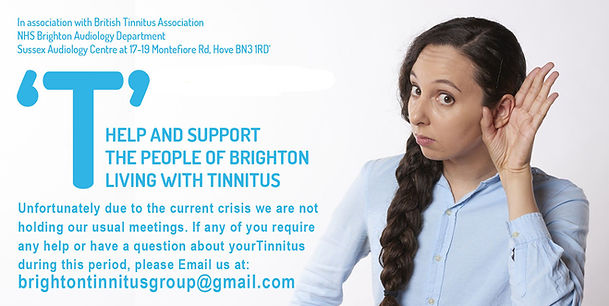
WE ARE HOLDING MEETINGS AT
FRIENDS MEETING HOUSE,
SHIP STREET BRIGHTON ON
4th WEDNESDAY OF EACH MONTH
We would love to see any of you who feel the need for some support or advice. Bring family, friends or anyone who would like to learn more about tinnitus.
IF YOU NEED HELP WITH YOUR TINNITUS COME ALONG AND HAVE A CHAT
PUT IN YOU CALENDER OR DIARY.
LOOK FORWARD TO SEEING AS MANY OF YOU AS POSSIBLE
Tinnitus is the perception of noises in the head and/or ear which have no external source, it is often described as buzzing or ringing in the ears. The British Tinnitus Association's vision is a world where no one suffers from tinnitus.
We are grateful for the the help in running
BRIGHTON TINNITUS SUPORT GROUP
In Association with
British Tinnitus Association
NHS Brighton Audiology Department
TINNITUS SUPPORT IN BRIGHTON

BRIGHTON TINNITUS SUPPORT GROUP
MEETINGS ARE HELD MONTHLY ON THE FOURTH WEDNESDAY OF THE MONTH FROM 2 - 3.30pm
at Friends' Meeting House, Ship Street, Brighton,
East Sussex, BN1 1AF
We will have a general discussion and sharing of ideas and support. You are welcome to bring friends or family who would like to learn more about tinnitus.
As usual, come along to:
The Friends Meeting House, Ship Street, Brighton, BN1 1AF
MONTHLY MEETINGS IN BRIGHTON
Our aim is to support those with Tinnitus
informing, educating and giving advice.
We have guest speakers, assistive equipment, reading materials and information regarding the latest research; also relaxation exercises and techniques as well as positive conversation.
We normally meet at The Friends Meeting House in Ship Street Brighton, BN1 1AF at 2.00-3.30pm. The meetings are fairly informal where members can exchange experiences and general help and support other members.
We also arrange from time to time for professional therapists in relaxation, Sound Therapy, exercise to try and reduce the stress from Tinnitus.


Types of tinnitus
It is usually caused by a change in blood flow, or change in awareness of that blood flow, in the vessels near the ear. If you are experiencing symptoms like these, please speak to your GP who will suggest a number of different tests.
If there is a physical reason for the pulsatile tinnitus, treating the underlying cause can help.
HYPERACUSIS (pronounced hyper-a-queue-siss) is a condition when people experience the sounds of everyday life as intrusively loud or uncomfortable or even painful.
Hyperacusis affects people in different ways. For some, it is a minor annoyance. Others find it difficult to live with and withdraw from social and professional activities. This isolation can make the problem worse. Therapy can help to address fears and anxieties and sound therapy can help to re-build a tolerance for sound.
If you are concerned about your tolerance to noise, please discuss this with your GP, who can refer you for an appropriate specialist opinion.
MUSICAL HALLUCINATION You may be familiar with “earworms”, where a snatch of song or jingle gets stuck in your head once you’ve heard it. Musical hallucination or musical tinnitus is also the experience of hearing music when none is being played, but it tends to be longer lasting, and doesn’t mirror any external music you may have heard recently.
Hearing sound that no-one else can hear is quite common and is called tinnitus. This experience is normally of a simple sound such as a buzzing, ringing, or sizzling. For some people however, these experiences can be more complex and emotive, and music can be heard.
In most people with musical hallucination, there is no underlying cause. There is not thought to be a connection to mental health conditions.
The intrusiveness of musical tinnitus can be managed with the techniques used to treat other forms of tinnitus.
For more information onTypes of Tinnitus go to:
https://tinnitus.org.uk/understanding-tinnitus/what-is-tinnitus/types-of-tinnitus/

Brighton Tinnitus Support Group
In association with British Tinnitus Association
NHS Brighton Audiology Department
Sussex Audiology Centre at the Wilbury Clinic, Hove
Our Aims
To share coping strategies among people
experiencing tinnitus.
To provide access to resources.
To provide an opportunity to share
experiences, so people can engage with
different perceptions and ideas.
To be involved in discussion and not talked to.
Our Ground Rules
All things shared in the group are confidential.
We will respect one another.
Only one person speaks at a time.
To be mindful of the restrictions of time we have
and let everyone have an opportunity to contribute
should they choose to.



